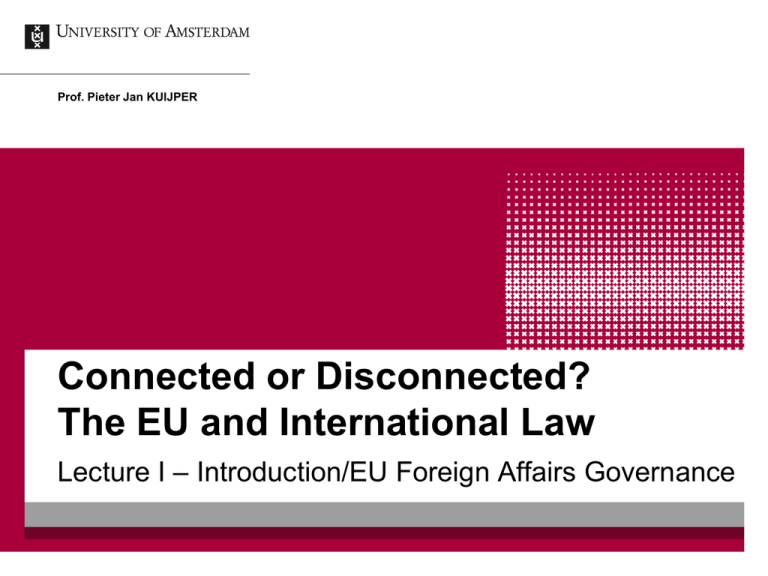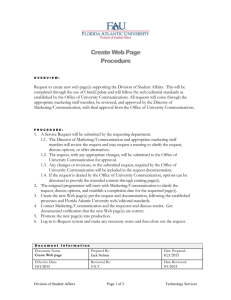The special character of foreign relations.
advertisement

Prof. Pieter Jan KUIJPER Connected or Disconnected? The EU and International Law Lecture I – Introduction/EU Foreign Affairs Governance Connected or Disconnected: the Question. Where does the EU stand on the continuum? “A new legal order of international law” “A new legal order” Case 26/62 Van Gend en Loos Case 6/64 Costa – ENEL A legal order outside international law? Case C-402/05 P Kadi v Council Case C-459/03 Comm v Ireland (MOX Plant) Lecture I: Introduction & Foreign Affairs Governance 2 To answer that first question, what other questions to ask? Has the EU legal order evolved in a way so as to keep itself separate from international law? What is the place of international law in the EU legal order? (internal aspect). Lecture 2-3. Has the EU insisted on special treatment in international legal relations and have other actors accepted that claim? Has the EU gone too far in its exceptionalism? Lecture 3-6. Lecture I: Introduction & Foreign Affairs Governance 3 What are the preliminary issues? What are the characteristics of the EU system? In general? In the field of “foreign affairs”? From which perspective? The relationship EU - MS : “Federalism” The relationship between the Institutions: The “Trias Politica” The special character of foreign relations. The evolution of foreign relations over 50 years of EC/EU. Lecture I: Introduction & Foreign Affairs Governance 4 The characteristics of the EU system. Where does the EU stand on a federalism scale? Compare with the US. Separate “federal”/EU law? Separate “federal”/EU institutions? How is EU law implemented and by whom? By “EU institutions” or by Member State institutions? The leading principle: subsidiarity –art 5 TEU L How is the unity of “federal”/EU law secured? Lecture I: Introduction & Foreign Affairs Governance 5 The characteristics of the EU system 2 Articles 2+3 TEU L. The ideals of the EU. Normally they require a separation of powers. Does such separation exist in Int. Organizations? ECJ always very circumspect: “balance beteen institutions” This is no longer justified, if you look at the Treaty of Lisbon. New provision on delegation of legislative power (art. 290 TFEU) and conferral of implementing powers(art. 291 TFEU) Sufficient separation between the legislative, the executive, and the judiciary? Link with “federalism”…. Lecture I: Introduction & Foreign Affairs Governance 6 The special character of foreign relations. Foreign Relations and Federalism US v Curtiss-Wright Export Corp. (1936) “The two classes of powers are different, both in tespect of their origin and their nature. The broad statement that the federal government can exercise no powers except those specifically enumerated in the Constitution, and such implied powers as are necessary and proper to carry into effect the enumerated powers, is categorically true only in respect of our internal affairs……” “The powers to declare and wage war, to conclude peace, to make treaties, to maintain diplomatic relations with other sovereignties, if they had never been mentioned in the Constitution, would have vested in the federal government as necessary concomitants of nationality.” “The President is the constitutional representative of the United States with regard to foreign nations.” No full parallel with EU situation intended; just strong pronouncement on an important problem. Lecture I: Introduction & Foreign Affairs Governance 7 The special character of foreign relations 2 Foreign Relations and the Trias Politica Goldwater v Carter (1979) “I am of the view that the basic question presented by petitioners in this case is ‘political’ and therefore, non-justiciable because it involves the authority of the President in the conduct of our foreign relations and the extent to which the Senate or the Congress is authorized to negate the action of the President” (Rehnquist) “Prudential considerations persuade me that a dispute between Congress and the President is not ready for judicial review unless and until each branch has taken action asserting its constitutional authority… If Congress…. had [formally] challenged the President’s authority to terminate the treaty with Taiwan……it would be the duty of this Court to resolve the issue.” (Powell) Lecture I: Introduction & Foreign Affairs Governance 8 The foreign relations revolution Character of Foreign Relations has changed Information revolution Expansion of expertise – Think tanks etc. Greater coverage: no longer “high politics” alone. For the EU this meant no longer “low politics” alone: CFSP Democratization of foreign relations: e.g. Trade policy. One “political line” more difficult to hold: Coherence! Lecture I: Introduction & Foreign Affairs Governance 9 Interim Summary Influence of the following factors on the historical development of EC/EU foreign relations. Executive and co-operative federalism Separation of powers The special character of foreign affairs Separation “high” and “low” foreign affairs “Revolution” in foreign affairs Lecture I: Introduction & Foreign Affairs Governance 10 The Lisbon Treaty Article 1 TEU By this Treaty, the HIGH CONTRACTING PARTIES establish among themselves a EUROPEAN UNION, hereinafter called "the Union" on which the Member States confer competences to attain objectives they have in common. ……… The Union shall be founded on the present Treaty and on the Treaty on the Functioning of the European Union (hereinafter referred to as "the Treaties"). Those two Treaties shall have the same legal value. The Union shall replace and succeed the European Community. Article 47 TEU “The Union shall have legal personality.” Lecture I: Introduction & Foreign Affairs Governance 11 Other Fundamentals Recall Articles 2 and 3 TEU (discussed earlier). Article 4 TEU: Respect for the Member States, their national identities, fundamental structures and essential State functions. Principles of conferral, subsidiarity and proportionality (Article 5 TEU). Charter of Human Rights incorporated (Art. 6). Accession to the ECHR (Art. 7 TEU). Consequences of all this for Foreign Relations? Lecture I: Introduction & Foreign Affairs Governance 12 Coherence between all aspects of foreign relations. Article 21 embodies this aspiration. The World a bigger EU? (para. 1) Mixture of CFSP goals (para. 2a,b.c and h) and “old EC” objectives (para. 2d,e,f,g, and h). To be carried out under “this Title” of the TEU and by the new Part V of the TFEU. Lecture I: Introduction & Foreign Affairs Governance 13 CFSP Broad power covering all aspects of foreign policy and progressive development of common defence policy. Binding decisions, strong loyalty clause, but… Unanimity. No legislation, no preemption. No infringement procedure Reduced roles of Commission and Parliament No judicial control by the Court (Art. 24(1) TEU) Except: Border line between TEU and TFEU (Art. 40 TEU) Sanctions against individuals (Art. 275 TFEU Lecture I: Introduction & Foreign Affairs Governance 14 The “Institutions” of the CFSP The European Council. The President of the European Council. The Council of Ministers. Political and Security Committee. The High Representative. Special Representatives. European External Action Service. Union delegations. Lecture I: Introduction & Foreign Affairs Governance 15 Fundamentals of the TFEU (art. 2 and 3) Exclusive, shared and supportive powers. Preemption in the area of shared powers. No harmonization in areas of supportive powers. Exclusive powers in foreign relations. Monetary policy Common commercial policy Conservation of the marine biological resources in the common fisheries policy. Lecture I: Introduction & Foreign Affairs Governance 16 Additional Exclusive Power in Treatymaking Article 3(2) TFEU: “The Union shall also have exclusive competence for the conclusion of an international agreement when its conclusion is provided for in a legislative act of the Union or is necessary to enable the Union to exercise its internal competence, or in so far as its conclusion may affect common rules or alter their scope.” Taken from existing case law Case 22/70 (AETR), Opinions 1/76 and 1/94 Lecture I: Introduction & Foreign Affairs Governance 17 The Union’s External Action TFEU Part V Common Commercial Policy Development Cooperation Economic, Financial and Technical Cooperation Humanitarian Aid Restrictive Measures International Agreements Union’s Relations with I.O.’s, Third Countries and Union Delegations. Lecture I: Introduction & Foreign Affairs Governance 18 Treaty-making power Article 216 TFEU: “The Union may conclude an agreement with one or more third countries or international organisations where the Treaties so provide or where the conclusion of an agreement is necessary in order to achieve, within the framework of the Union’s policies, one of the objectives referred to in the Treaties, or is provided for in a legally binding Union act or is likely to affect common rules or alter their scope.” What is the relation with Article 3(2) TFEU ? Lecture I: Introduction & Foreign Affairs Governance 19 Characteristics of the EU External Action. Normal “Community” governance. “Normal” role Commission + external representation QMV in the Council in principle. Increased and now “normal” role of Parliament. “Normal” role of the EU Courts Legislation. In areas of shared competence, there is preemption through the AETR doctrine as codified. Agreements are binding on the Member States. Lecture I: Introduction & Foreign Affairs Governance 20 Tension between CFSP and rest of External Action in the age of coherence. Best expressed in the Treaty-making procedure of Article 218 TFEU. Provisions on the opening of the negotiation (Article 218, para 3). Provisions on the conclusion of the agreement (art. 218, para. 6). Relation with Article 40 TEU? Binding agreements. Role of the Court? Lecture I: Introduction & Foreign Affairs Governance 21 Conclusions on the post –Lisbon in foreign affairs. Executive Federalism placed into sharper focus. Separation of powers has become clearer. The special character of foreign affairs, especially “high” foreign affairs continues to be emphasized by the “One Union; two treaties situation.” “Revolution in foreign affairs” has had a pervasive influence on all of it. Lecture I: Introduction & Foreign Affairs Governance 22







